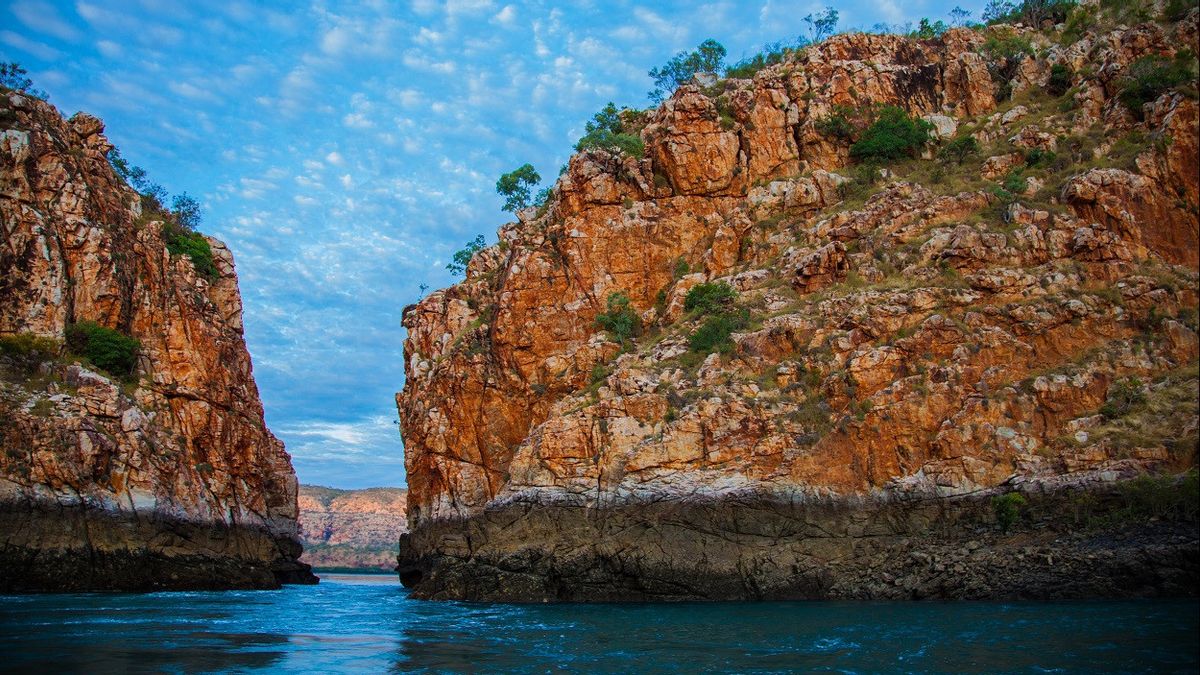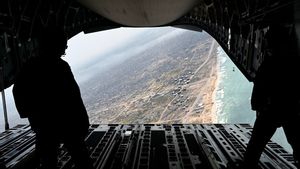JAKARTA - The State of Western Australia (WA) will prohibit shipping boats crossing Horizontal Waterfall, one of the natural attractions as well as the wealth of local customs, a move that has raised support and opposition.
Horizontal Falls is one of Australia's most unique natural attractions, a combination of coastal geography and strong tidal power, so visitors are willing to pay a heavy price to see it up close.
Located in Teluk Batton, a remote place on the country's northwestern coastline, this waterfall was created when sea waves flowed between two narrow cliff gaps, creating waves of up to four meters that resemble waterfalls.
For decades, the tour has penetrated this gap with a strong boat, which has disappointed Indigenous Traditional Owners in the area, who said the site was sacred.
That's not the only reason why the boat tour has become controversial. In May 2022, a boat hit a rock that resulted in an injury to passengers and sparked a massive rescue operation. The incident caused calls to stop the tour for security reasons.
Although the boat's journey continues, concerns from Indigenous Traditional Owners have now been noticed. Western Australian authorities, the state where the waterfall is located, said the trip would be banned in 2028 as a form of respect.
Located in the Kimberley area, 1,900 kilometers (1,180 miles) north of the Perth state capital, Horizontal Falls is inside the Maiyalam, one of three protected marine parks created in 2022 designed together, and now jointly managed, by Traditional Owners and the WA Government.
The West Australian Government's move comes amid criticism of its commitment to protecting the sites of indigenous peoples in states that rely heavily on mining.
Setelah larangan tersebut berlaku, kapal masih diperbolehkan berlayar di Teluk Batton, sehingga pengunjung dapat melihat dari dekat gampang yang disebut oleh naturalis Inggris David Attenborough sebagai "daya tarik australia yang paling tidak biasa."
"This decision reflects the government's dual responsibility to respect the cultural views of Traditional Owners and the need to protect and support the WA tourism industry," WA Environment Minister Reece Whitby said in a statement.
"We want the public to feel the Indigenous culture as an important and dynamic part of visiting national parks and marine parks which are jointly managed throughout Western Australia," he continued.
The ban was welcomed by the Dambeemadadee Tribe, which has lived in the area for 56,000 years and believes that the boat tarnished the waterfall.
The Dambeemadaddee tribe was one of dozens of indigenous peoples living in Western Australia for more than 50,000 years before Australia was colonized cruelly by the UK in the 1780s. Countless areas of land controlled by indigenous peoples were later confiscated or littered.
The Horizontal Waterfall ban aims to restore the purity of this site. According to the beliefs of local indigenous peoples, the boat that penetrated this gap disturbed Woongudd, the mystical snake that created this miracle.
The story of Woongudd is featured in Dreamtime, a collection of ancient stories and principles that define Australian Aboriginal culture. The high tide in the waterfall is said to be caused by Woongudd sliding between cliffs.
Since the 1990s, Traditional owners have expressed concern that boat tourism is damaging this "sacred and holy place", Dambeemadadee said in a group statement, responding to the ban.
"This is a journey full of emotional challenges for many of us," they wrote.
"With this decision, we finally felt listened to. Our ancestors lived there all year round, and we still felt their presence. This is a quiet and calm place. But it can be dangerous. Culturally, Traditional owners will only travel through gaps for certain purposes and always at the right time," he continued.
Nevertheless, Dambeemadaddee emphasized its hope that tourists will continue to visit Horizontal Falls. They believe that tourists can be fascinated by the strength of their ups and downs while keeping their distance politely.
"Hormati kesakralan tempat ini, dan kewajiban budaya kita untuk menjaga negara dan menjaga keselamatan Anda, mengusuk mereka kepada para pengunjung, mengacu pada peran ekspat mereka sebagai penjaga tanpa Australia.
In preparation for the ban on Horizontal Falls, Dambeemadadee stated that they had started making new videos and brochures that would explain their cultural and spiritual relationship with Teluk Batal. They also created new tours, welcoming ceremonies, and visitor management plans for the location.
The operator of the main boat tour in TelukLANton, Horizontal Falls Seaplane Adventures, will stop crossing the waterfall in March 2028, and all other operators will stop by the end of 2026.
Horizontal Falls Seaplane Adventures said in a statement that it would switch to "a culture-appropriate program that would allow visitors to feel the spectacular natural magic of Horizontal Falls in a mutually respectful context".
But not everyone is happy with this move. The WA Tourism Council, which represents the state's tourism business, has warned it will deter visitors and cause large job loss.
WA Tourism Council CEO Evan Hall said this activity had long attracted visitors to Kimberley. He added that the ban would have an impact on 15 tourism operators, and was expected to cause the loss of 58 full-time jobs in the region.
"By crossing the waterfall, visitors feel the natural beauty of this unique environment," Hall said in a statement earlier this month.
"That's not something that can be experienced from the sidelines. National Parks are public land and waters owned by everyone. The goal of the National Park legislature includes promotion and facilitation of tourism based on nature and public recreation," this could not be achieved by limiting visitor access.," he continued.
SEE ALSO:
However, the ban was backed by Kimberley Day Cruise CEO Sally Shaw, who told CNN his company's Horizontal Falls tour was only near, not between the cliff gaps. He said stabbing the waterfall was dangerous and disrespectful of its traditional owners.
"We didn't cross the waterfall for security and culture reasons and never did this on our tour," Shaw explained.
"Most of the people who tour have a cultural understanding and realize that the future is a sustainable national treasure that we can safely appreciate," he said.
The English, Chinese, Japanese, Arabic, and French versions are automatically generated by the AI. So there may still be inaccuracies in translating, please always see Indonesian as our main language. (system supported by DigitalSiber.id)













